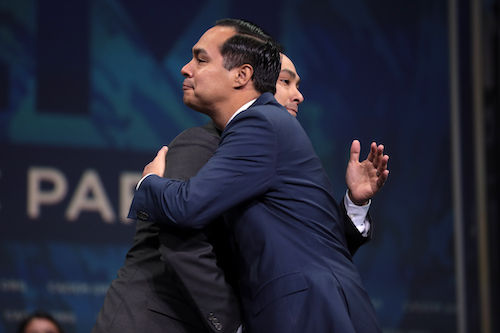Representative Joaquin Castro, D-TX, opened a controversy this week when he tweeted a list of Republican donors who live in his El Paso congressional district. Politics aside, its most important impact comes in revealing one of the greatest spiritual crises currently gripping the West: political idolatry.
On Monday, Rep. Castro tweeted:
Sad to see so many San Antonians as 2019 maximum donors to Donald Trump — the owner of @BillMillerBarBQ, owner of the @HistoricPearl, realtor Phyllis Browning, etc.
Their contributions are fueling a campaign of hate that labels Hispanic immigrants as ‘invaders.’ pic.twitter.com/YT85IBF19u
— Joaquin Castro (@Castro4Congress) August 6, 2019
Critics accused him of inciting economic, or physical, harm against private citizens based on their political views. This is not without foundation, as there has been a rhetorical attempt to blame the El Paso shooting and other acts of Racial Collectivist Terrorism, first on President Donald Trump, and then on his supporters. For example, on Monday former Republican Joe Scarborough told GOP donors, “It’s on you. It really is. It’s all on you.”
Furthermore, the Left widely endorsed the principle that it is acceptable to “punch a Nazi,” with the definition of “Nazi” tobogganing down the proverbial slippery slope as the debate unwound. Concerns for the safety of those named (in at least one case, falsely) are too real.
Reasonable people can differ about politics, and certainly about the proper limits of political rhetoric. This debate is important for the fact that it reveals two truths about this moment in the West.
First, it shows why non-government, market solutions are preferable to political ones. The market unites, while politics divides. Bosses who operate on a strictly economic basis neither care nor inquire about the political views of the best-qualified plumber, electrician, or engineer. Efficient employees care only about their co-workers’ competence and interpersonal soft skills, not their ideology. Politics divides by creating polarized teams fighting over zero-sum outcomes.
Second – and more importantly – it shows modern political debate in the West has degenerated to nothing less than idolatry. And by whipping up hatred of “the other” (and often a caricature of the other, at that), politics harms our souls.
This latter point is eloquently expressed in an essay titled “How politics stole your soul” by Ben Ryan, head of research at Theos, a Christian think tank based in the UK.
Ryan notes that political animosity has increased even as other forms of prejudice and chauvinism based on race, etc., has declined. He cites comparable issues in the pre-Brexit UK; one can only assume the situation has worsened since 2016.
In this, he follows the footsteps of researchers Shanto Iyengar and Sean Westwood, who found that partisan members of one political party are less likely to give a scholarship to more qualified applicants if they belong to the opposite political party.
Political fanatics now discriminate against their ideological opponents “to a degree that exceeds discrimination based on race,” they wrote.
Ryan adds that the understanding that partisans of one side have of the other is consistently, demonstrably wrong:
A report from More in Common found that Americans were consistently wrong about what the other side of the political aisle believed. Their ‘mental image’ of the other side was a gross caricature fit only to be mocked or despised. This makes for a dangerous cocktail in which political identity has become more important to people, indeed essential to their own sense of self and the other, but also strangely empty, defined more by the extent to which we hate the other side than to which we believe in our own.
Worse yet, this is a spiritual and not an intellectual battle, as surveys find the most educated people have become the worst offenders:
In fact, the better educated you are, the more likely you are to vilify and reject the opposite side. The more numerate you are, the more likely you are to twist the data and evidence to fit your own preconceived partisan bias. This is tribal warfare as driven by the educated elites.
What can free the West from this increasingly shrill conflict? True faith. He writes:
[T]he path to breaking the grip of politics on our souls is to re–empower other forms of belonging and identity. As nation, faith and other pre–political identities have been consciously or unconsciously side–lined as acceptable features of public debate so politics has taken on an ever greater importance.
As faith in God recedes, it is replaced with the idols of race, identity politics, or class conflict. These tribal deities reorder our priorities. They twist our identities. Their determination to seek offense, cherish the cheap thrill of anger,and dehumanize others poisons our relationships.
And as recent days have driven painfully home, false gods often send their adherents on religious wars.
(Photo credit: Gage Skidmore. CC BY-SA 2.0.)

